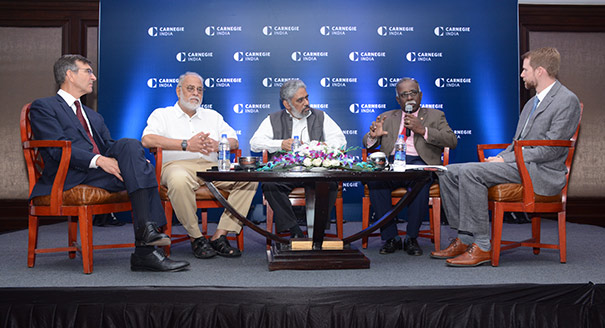Registration
You will receive an email confirming your registration.
With India and Pakistan close to the brink of confrontation, the subcontinent presents an illuminating study in what happens when traditional assumptions about deterrence no longer hold. As India confronts the question of how to motivate Pakistan to prevent cross-border attacks on Indian soil, George Perkovich and Toby Dalton offer a timely new book, Not War, Not Peace?, that assesses the violent and non-violent options available to New Delhi and their likely consequences.
Carnegie India hosted a book launch with George Perkovich, vice president for studies, and Toby Dalton, co-director of the Nuclear Policy Program at the Carnegie Endowment for International Peace. C. Raja Mohan, director of Carnegie India, moderated a discussion with Manoj Joshi, distinguished fellow at the Observer Research Foundation, and retired Air Marshal M. Matheswaran.
Discussion Highlights
- Unprecedented Complexity: Participants examined the balance New Delhi must strike between satisfying domestic pressures to exact punishment while preventing possible escalation. Participants argued that the key challenge facing India is how to coerce Pakistani leadership into dismantling the terror infrastructure on their land, while ensuring that whatever conflict may arise does not leave India worse off than it was after a terrorist attack. Discussants agreed that the complexity of meeting such objectives is unprecedented, given that there is little in nuclear deterrence theory that posits terrorism as an instigating factor, nor is there counter-terrorism theory that accounts for an adversary possessing nuclear weapons.
- Options: Perkovich and Dalton examined several different options available to New Delhi in the wake of an attack from within Pakistan, and the significant potential ramifications of each option:
- Army-centric Operations: They explained that one option available to New Delhi is an army-led ground incursion intended to punish the Pakistani army while remaining under the nuclear threshold. Participants agreed that the likelihood is that any action targeting the military or attempting to reconfigure borders would elicit an escalatory response from the Pakistani military. Under duress, the Pakistani military might even increase support for militant groups, further intensifying cross-border terrorism. Conversely, if India and Pakistan were to make headway on cooperating on counter-terrorism, such a strategy may prove to be counterproductive. The Pakistani military, they explained, would have a key role to play in containing terror groups operating within their borders.
- Air Power: Participants discussed how advances in intelligence, surveillance, and reconnaissance capabilities make air power a potentially effective option for quick punishment. However, they agreed that this option also poses a risk of escalation. The chances of escalation from an operation carrying out an air strike on a terrorist camp in Kashmir, they said, is relatively low compared to a strike on a terrorist camp in Punjab. However, limited reactions to a strike with a low risk of escalation might be seen as evidence of an unwillingness to take risks, thereby diminishing its punitive value. Riskier action would also raise the issue of whether air power can be isolated from ground forces, they added. The Indian army would have to be mobilized in preparation for Pakistan’s response, which in turn would only provoke mobilization on the other side of the Line of Control.
- Covert Operations: While India possesses the capacity to carry out covert actions, this capability may not be developed enough to tackle complex operations, participants argued. Discussants raised a number of critical questions about the potential to use covert operations as a response to an attack. For example: Are there human intelligence networks inside Pakistan that would enable such action? Is there a legal framework within India that would allow for targeted killing? Are special operations sufficiently integrated within the decision-making process to utilize them within a short time frame? While the use of covert operations may create equivalence between India and Pakistan in international public opinion, it could also create greater space for bargaining, participants said. But they also pointed out that a key drawback to this approach is that covert operations are by their very nature confidential and carry negligible political and psychological benefits in the public eye.
- Nuclear Capabilities: With Pakistan developing tactical nuclear weapons, the nuclear threshold in the subcontinent has been effectively lowered, participants said. There are steps India can undertake to modify its capabilities or posture to make its nuclear doctrine more credible in ways that would open up space for more conventional options without risking escalation. However, participants argued that in the event of escalation, terminating conflict on terms that would be favourable to India when the potential for damage is so significant would be extremely challenging.
- Nonviolent Compellence: Participants argued that nonviolent compellence is the only viable option that would ensure India is not worse off than before. Participants discussed whether diplomacy, by building international pressure and pressing for sanctions at international institutions, could be constructed into policy that would have long-term motivational effects. As India does not aspire to be a regional hegemon, they said, there is a strong inclination towards multilateral cooperation and in jointly denouncing Pakistan’s support for terrorism. Countries like the United States and China would have to offer support for this strategy to be truly effective. Further, the United Nations Security Council Resolution 1373, a counter-terrorism measure adopted under Chapter VII of the United Nations Charter that is binding on all UN member states, should be invoked to augment a global effort. The exercise of strategic patience, rather than strategic restraint, does not risk escalation, so there is no real disadvantage to trying, discussants said. They added that India’s current policy towards Pakistan is applied on an ad hoc and instinctive basis, but that the application of a systematic combination of multiple strategies would need to be built into the Indian decision-making structure to truly deliver results.
This event summary was prepared by Arushi Kumar, a research assistant at Carnegie India.
